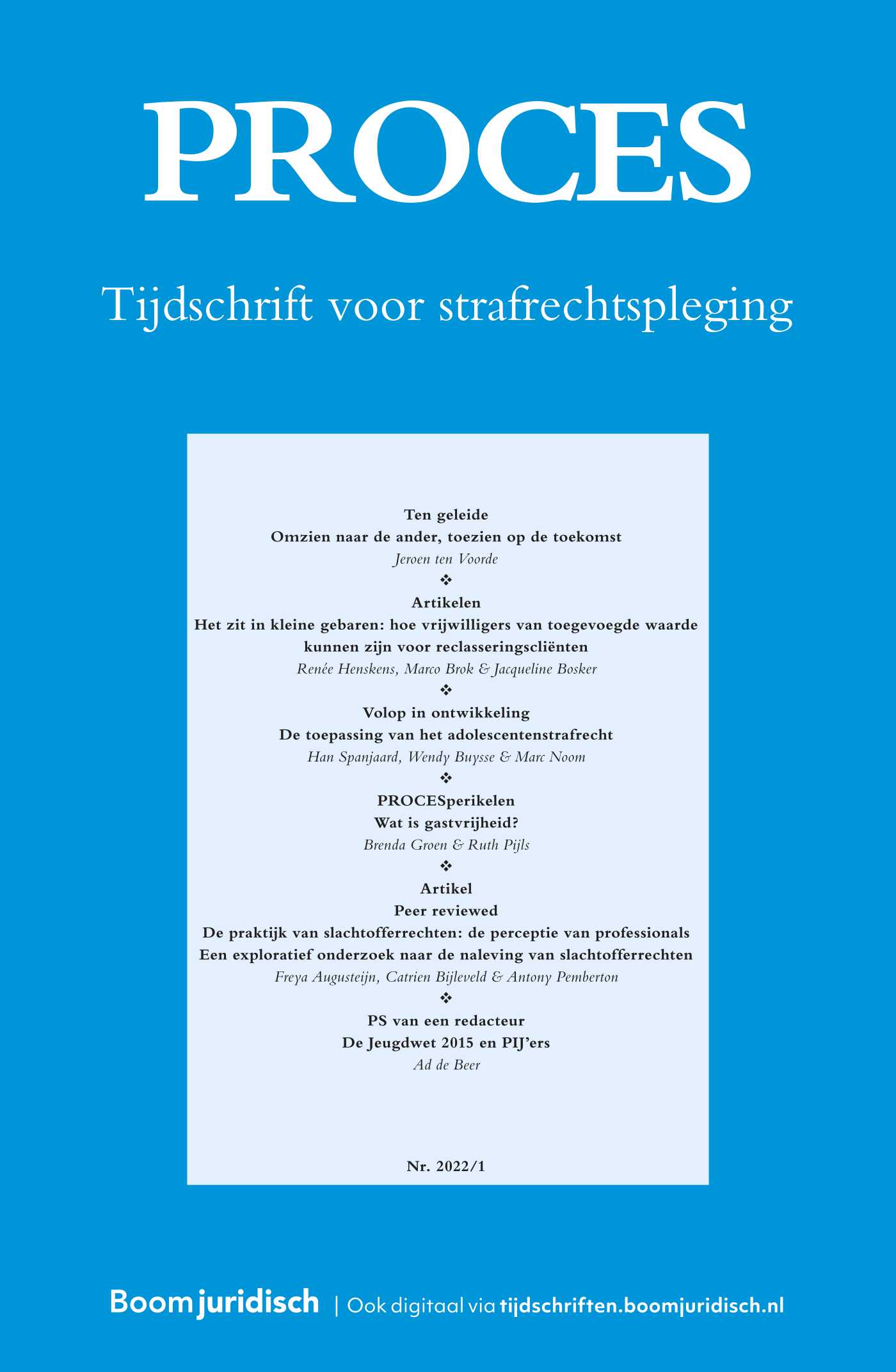|
Worldwide, at least 1,900 Dutch prisoners are housed in foreign detention every year. Although previous research describes this group of prisoners and the conditions of their detention, it is unknown to what extent they reoffend after returning to the Netherlands. A unique dataset with data of 690 Dutch people has been used. They are supervised during their foreign detention by the International Office, part of the Dutch Probation Service. The results show that 23% of this group reoffended within two years. Furthermore, the probability of reoffending differs for the country of detention, age, way of return and prior incarcerations. |


PROCES
Meer op het gebied van Criminologie en veiligheid
Over dit tijdschriftMeld u zich hier aan voor de attendering op dit tijdschrift zodat u direct een mail ontvangt als er een nieuw digitaal nummer is verschenen en u de artikelen online kunt lezen.
| Ten geleide |
Wij blijven binnen. Jij toch ook?Hoe gedetineerden in lockdown ludiek het nieuws haalden |
| Auteurs | Prof. dr. Joke Harte |
| Auteursinformatie |
| Artikel |
|
| Trefwoorden | reoffending, foreign detention, returning prisoners |
| Auteurs | Matthias van Hall MSc en Laura Cleofa-van der Zwet MSW |
| SamenvattingAuteursinformatie |
| Artikel |
Hoe kan sport bijdragen aan het re-integreren van delinquenten? |
| Trefwoorden | sport, delinquency, desistance, probation, prison |
| Auteurs | Dr. Lianne Kleijer-Kool, Dr. Jacqueline Bosker en Mr. Moniek Zuurbier |
| SamenvattingAuteursinformatie |
|
The contribution of sport to reintegrating offenders receives limited attention, both in science and in the practice of probation and the prison system. From the perspective of desistance, this literature study concluded that sport can contribute to the development of individual capital, social capital and an alternative identity. However, the effect of sport is not necessarily positive. There are risks of negative influence or the reinforcement of problem behaviour. In counselling offenders, sport should be combined with other interventions to reduce recidivism. A personalized approach is required, based on the risk-need-responsivity model. |
| PROCESperikelen |
Recherchewerk, een veranderend vakgebied |
| Trefwoorden | specialist tracing, police work |
| Auteurs | Marjolein Smit-Arnold Bik MPA |
| Auteursinformatie |
| Peer reviewed |
Participatie onder drukMismatch tussen niet-westerse migranten en hulpverleners – acties tot betere allianties! |
| Trefwoorden | Migration, acculturation, participation, cultural diversity, social work |
| Auteurs | Dr. Youssef Azghari, Prof. dr. Janine Janssen en Dr. Christa Nieuwboer |
| SamenvattingAuteursinformatie |
|
Two major shifts in the Dutch policy have changed how social professionals work for migrants. These two refer to the change from a multicultural in an assimilation policy and a participative society where people are more dependent on their network or resilience for dealing with their needs. Based on our exploratory interviews with eight professionals and a focus group of six participants with a non-western cultural background we conclude that what migrants expect from social professionals and what they can offer do not match. It is due to contrasting views and cultural differences. This has a negative impact on their participation. |
| Artikel |
Straftoemeting in zaken betreffende seksuele uitbuiting van minderjarigen |
| Trefwoorden | human trafficking, child victims, sentencing, Defence for Children |
| Auteurs | Mr. Eva Huls en Drs. Frits Huls |
| SamenvattingAuteursinformatie |
|
This article is a summary of the recently published study of Defence for Children - ECPAT: Sentencing of Sexual Exploitation of Minors: an analysis. The aim of the research was to provide insight into the penalties imposed in 2015-2019 in cases involving the sexual exploitation (human trafficking) of child victims. Another aim was to gain a better understanding of how the sentence was determined. A total of 145 convictions were analysed. This article first describes (the reason for) the research. Subsequently, the crime of human trafficking is briefly discussed. The findings of the analysis are then presented in a summarized version. Finally, the conclusion and recommendations follow. |
| Artikel |
Gender en geweldOver hoe Nederland laveert tussen genderneutraliteit en internationale aandacht voor geweld tegen vrouwen |
| Trefwoorden | gender, violence, GREVIO, Istanbul Convention |
| Auteurs | Dr. mr. Wendy Guns en Prof. dr. Janine Janssen |
| SamenvattingAuteursinformatie |
|
Internationally the term ‘violence against women’ has been coined. In the Netherlands is referred to ‘violence in relations of dependency’. GREVIO has critiqued Dutch government for their ‘gender neutral’ approach towards intimate violence, amongst other things by using the term ‘violence in relations of dependency’ instead of ‘violence against women’. This contribution offers a critical analysis of GREVIO’s point of view regarding Dutch policies on domestic violence. |
| PS van een redacteur |
De toon die de muziek maakt |
| Auteurs | Mr. Coosje Peterse |
| Auteursinformatie |
| Call for papers |
Call for papers |

